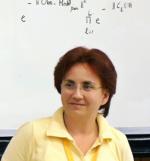
Dusanka Perisic
Interview
From Women Mathematicians around the World, a Gallery of Portraits
Faculty of Sciences and Mathematics, University of Novi Sad,
Trg D. Obradovica 4, 21000 Novi Sad, Serbia
dusanka.perisic at dmi.uns.ac.rs
Education
1986: BS in Mathematics, Faculty of Sciences, Novi Sad;
1989–1990: summer semester postgraduate studies at the Institute of Mathematics and Geometry, University of Innsbruck (Austria)
1991: MS in Mathematics, Faculty of Sciences, Novi Sad
1992: PhD in Mathematics, Faculty of Sciences, Novi Sad
Professional experience
2006–2012: Vice dean of Faculty of Natural Sciences and Mathematics, University of Novi Sad (in charge of organization and finance)
since 2003: Full professor of mathematics, Faculty of Natural Sciences and Mathematics, University of Novi Sad.
1997–2003: Associate professor of mathematics, Faculty of Natural Sciences and Mathematics, University of Novi Sad.
1993–1997: Assistant Professor, Faculty of Natural Sciences and Mathematics, University of Novi Sad.
1987–1997: Teaching Assistant, Faculty of Sciences, University of Novi Sad.
1986–1987: Computer programmer, oil company “Naftagas” in Novi Sad.
Questionnaire
How and when did you come to choose to do mathematics?
I was good in mathematics but also in many other different subjects in school. I have “chosen” mathematics by an elimination process. I knew what I did not want to become, but not exactly what I would like to become. I come from a family of lawyers, and wanted to do something else. My perception of mathematics when I finished high school was wrong, and I was pleasantly surprised when I realized this after the first few lectures at university. It took me only a few weeks to realize that I had chosen the right thing.
Were you then encouraged by your family, friends or by other people around you?
Yes. My father was very proud of me, and mother was always there for me.
Did you come across obstacles in pursuing your career as a mathematician?
At the beginning of the nineties, when many of my colleagues decided to leave Serbia, hoping for a better life, I decided to stay, to go abroad to study, but to return back and establish my career in Serbia. I am aware that the easiest way is not always the best choice.
Do you think some of the possible difficulties are related to the socio-economic situation in your country?
I have experienced the so called scientific sanctions against Serbia (My Fulbright scholarship for doctoral studies in USA was approved but then suspended. I still have a letter from the editor of a mathematical journal saying that my paper was refused because of the sanctions), economic sanctions against Serbia, hyperinflation comparable with the one in Germany before the second world war, and then 72 days of bombing of my home town.
Now in retrospect the obstacles look insuperable, but at that time I believed that with a lot of energy, everything is possible.
Or to the fact that you are a woman?
Yes. But … Again the obstacles just looked insurmountable for a while. I vividly remember a conversation with my mother, who told me once “If you start to think that some job is not for a woman, you will end up with the conclusion that there is no job suitable for a woman.”
In retrospect, are you happy to have chosen mathematics or do you have some regrets? What are for you the joys of mathematics? What are for you the hardships of mathematics?
I have no regrets. The world of mathematics is universal, without visas, borders … A sanctuary, but it can also be a lonely place.
What would you recommend a young woman in your country wanting to start a career in mathematics?
To make a network of colleagues, friends.
Could you write a few lines in an understandable manner to non-experts, describing your topics of research and your favorite personal achievement in mathematics?
I work with a group of physicists who are trying to produce a model of climate changing.
